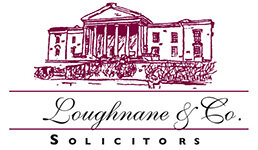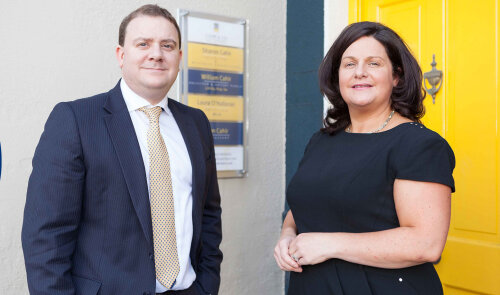Best Marriage Lawyers in Ennis
Share your needs with us, get contacted by law firms.
Free. Takes 2 min.
Free Guide to Hiring a Family Lawyer
List of the best lawyers in Ennis, Ireland
About Marriage Law in Ennis, Ireland
Marriage in Ennis is governed by Irish national family law and civil registration rules. Whether you plan a civil ceremony, a religious ceremony or a ceremony conducted by an authorised solemniser, you must follow the statutory requirements that apply across the State. Key practical steps include giving notice to the local registrar, providing required identity and status documents, and ensuring any prior marriages or civil partnerships have been legally ended. Same-sex marriage has been legal in Ireland since 2015, and marriages entered into in Ireland are recorded by the General Register Office.
Why You May Need a Lawyer
Many situations connected to marriage raise legal issues where specialist advice is helpful. Common reasons to consult a solicitor include:
- Checking the legal effects of a prenuptial agreement or preparing a nuptial agreement for clarity about finances and property;
- Navigating separation, judicial separation, or divorce proceedings and understanding the legal requirements and likely outcomes;
- Sorting out rights to property, pensions, and savings when couples separate;
- Arranging child custody, guardianship, access, and maintenance matters or responding to applications about children;
- Dealing with recognition of a foreign marriage or addressing immigration issues linked to marriage;
- Seeking urgent protective orders, or advice where domestic abuse, coercive behaviour or child protection concerns arise;
- Handling legal formalities when one party is deceased, including inheritance claims and estate issues that affect surviving spouses.
Local Laws Overview
Ennis follows the Republic of Ireland national laws on marriage and family matters. Key aspects to bear in mind include:
- Minimum age and capacity - both parties must have the legal capacity to marry and be at least 18 years old;
- Notice requirement - you must give notice to the local registrar in advance of the ceremony; in practice this requires an appointment and submission of identity and status documents;
- Registration - marriages are formally registered with the General Register Office, which issues the official marriage certificate;
- Divorce and separation - divorce is available under Irish law where statutory conditions are met, and courts make orders about custody, access and financial provision;
- Recognition of foreign documents - foreign birth, marriage, divorce or death documents often need certified translations and may require apostilles or other formal certification;
- Family law court routes - family law disputes are handled through the Irish court system, including District Court, Circuit Court and High Court depending on the issue and complexity;
- Consent and welfare of children - where children are involved, the courts focus on the best interests and welfare of the child when making decisions.
Frequently Asked Questions
What steps do I need to take to get married in Ennis?
Contact the local registrar to make an appointment and give notice of your intention to marry. At that appointment you will present identity and evidence of marital status, and the registrar will explain any waiting periods. After the ceremony the marriage is registered and you can obtain an official marriage certificate from the General Register Office.
How far in advance must we give notice to the registrar?
You should give notice to the registrar well in advance of your planned ceremony. There is a statutory notice period that the registrar will confirm when you make an appointment. It is advisable to book early to allow time for any additional documentation or checks.
What documents will we need to show at the registrar?
Typical documents include valid photo identification for both parties, original birth certificates or passports, proof of address, and evidence that any previous marriage or civil partnership has ended, such as a final divorce decree or death certificate. Foreign documents may require certified translations and formal authentication.
Can I change my surname after marriage?
Yes. After your marriage you can change your surname by using your marriage certificate as evidence with banks, the passport office, Revenue, social welfare and other organisations. The procedures and supporting documents required vary by organisation.
Are prenuptial agreements legally binding in Ireland?
Prenuptial agreements are not automatically legally binding in Irish courts. However, a well-drafted agreement that is fair, entered into with full disclosure and independent legal advice can be persuasive and may influence a court s approach to financial orders on separation or divorce. You should seek solicitor advice when preparing or relying on such an agreement.
How is property divided if we divorce?
There is no fixed formula. On divorce the court considers a range of factors including each spouse s contributions, the needs of both parties and any children, the length of the marriage and the standard of living. Courts can make orders about pension sharing, sale or transfer of property, maintenance and lump-sum payments. A solicitor can explain likely outcomes based on your circumstances.
What if one partner is not an Irish citizen - does that affect our ability to marry?
Non-Irish nationals can marry in Ireland but they must meet the same notice and documentation requirements as Irish citizens. Immigration status can affect practical arrangements and some statutory procedures, so it is important to check residency and immigration rules in advance and to bring appropriate identity and status documents to the registrar appointment.
How does the law protect children when parents separate?
Irish law prioritises the best interests and welfare of the child. Courts can make orders about guardianship, custody (care), access (contact), and child maintenance. Where possible parents are encouraged to reach agreements, but the court will intervene if needed to protect a child s welfare.
Can I get help from mediation instead of going to court?
Yes. Mediation is a voluntary process where an impartial mediator helps couples reach agreements about finances, property and children. It is often quicker and less adversarial than court. Solicitors and family mediation services in County Clare can provide information on mediation options.
Where do I go for urgent help if there is domestic violence?
If you or a child are in immediate danger call emergency services. For legal protection, the courts can issue protective orders and barring orders. There are local and national support organisations that help with safety planning and referrals, and solicitors can assist with the legal steps to secure protection and to obtain emergency remedies.
Additional Resources
For further information and assistance, consider contacting local and national organisations and bodies that provide information, registration services and legal support. Useful contacts include the General Register Office for marriage certificates; the local registrar or civil registration office in Ennis for appointments and notices; the Citizens Information Centre for free information on rights and procedures; the Legal Aid Board for information on means-tested legal aid; the Law Society of Ireland for finding a solicitor; the Courts Service for information on family law procedures; local family mediation services for alternative dispute resolution; and organisations that support victims of domestic abuse and children s welfare agencies for safety and protection concerns.
Next Steps
If you need legal assistance with any aspect of marriage - planning a marriage, preparing a prenuptial agreement, resolving separation or divorce matters, sorting child arrangements, or dealing with urgent protection issues - follow these steps:
- Gather your documents - identification, birth certificates, any previous marriage documentation and proof of address;
- Make an appointment with the local registrar in Ennis to give notice and to confirm the documents required for your ceremony;
- If you face a legal dispute or need advice on rights and options, contact a solicitor experienced in family law. Ask about initial consultations and whether legal aid or mediation might be appropriate;
- If safety is a concern, contact emergency services and organisations that provide crisis support immediately, and obtain legal advice about protection orders;
- Keep clear records of communications and financial documents, and seek independent legal advice before signing any agreement that affects your rights or those of your children.
Getting specialist legal advice early can clarify your rights, help you plan for the future and make the process smoother and safer for everyone involved.
Lawzana helps you find the best lawyers and law firms in Ennis through a curated and pre-screened list of qualified legal professionals. Our platform offers rankings and detailed profiles of attorneys and law firms, allowing you to compare based on practice areas, including Marriage, experience, and client feedback.
Each profile includes a description of the firm's areas of practice, client reviews, team members and partners, year of establishment, spoken languages, office locations, contact information, social media presence, and any published articles or resources. Most firms on our platform speak English and are experienced in both local and international legal matters.
Get a quote from top-rated law firms in Ennis, Ireland — quickly, securely, and without unnecessary hassle.
Disclaimer:
The information provided on this page is for general informational purposes only and does not constitute legal advice. While we strive to ensure the accuracy and relevance of the content, legal information may change over time, and interpretations of the law can vary. You should always consult with a qualified legal professional for advice specific to your situation.
We disclaim all liability for actions taken or not taken based on the content of this page. If you believe any information is incorrect or outdated, please contact us, and we will review and update it where appropriate.










